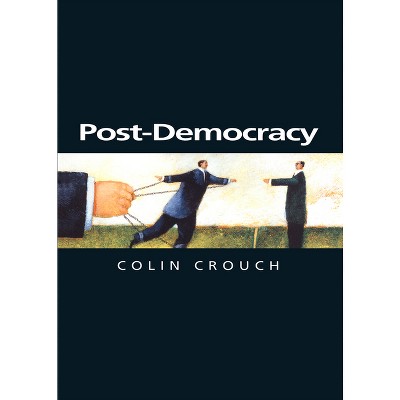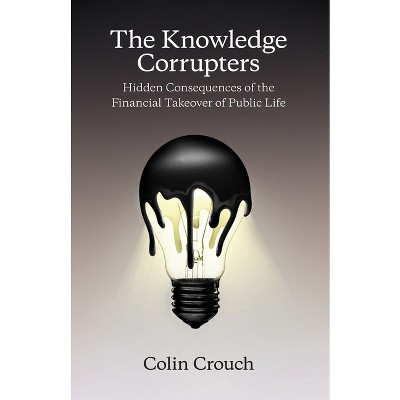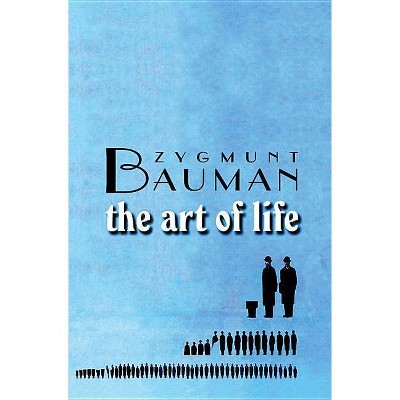Sponsored

The Strange Non-Death of Neo-Liberalism - by Colin Crouch (Paperback)
In Stock
Sponsored
About this item
Highlights
- Winner of the Friedrich Ebert Stiftung prize The financial crisis seemed to present a fundamental challenge to neo-liberalism, the body of ideas that have constituted the political orthodoxy of most advanced economies in recent decades.
- About the Author: COLIN CROUCH is Professor of Governance and Public Management at Warwick Business School, Fellow of the British Academy, and expert consultant to the Directorate for Public Governance and Territorial Development, OECD.
- 224 Pages
- Political Science, Political Economy
Description
About the Book
The financial crisis seemed to present a fundamental challenge to neo-liberalism, the body of ideas that have constituted the political orthodoxy of most advanced economies in recent decades. Colin Crouch argues in this book that it will shrug off this challenge.Book Synopsis
Winner of the Friedrich Ebert Stiftung prizeThe financial crisis seemed to present a fundamental challenge to neo-liberalism, the body of ideas that have constituted the political orthodoxy of most advanced economies in recent decades. Colin Crouch argues in this book that it will shrug off this challenge. The reason is that while neo-liberalism seems to be about free markets, in practice it is concerned with the dominance over public life of the giant corporation. This has been intensified, not checked, by the recent financial crisis and acceptance that certain financial corporations are 'too big to fail'. Although much political debate remains preoccupied with conflicts between the market and the state, the impact of the corporation on both these is today far more important.
Several factors have brought us to this situation:
- Most obviously, the lobbying power of firms whose donations are of growing importance to cash-hungry politicians and parties;
- The weakening of competitive forces by firms large enough to shape and dominate their markets;
- The power over public policy exercised by corporations enjoying special relationships with government as they contract to deliver public services;
- The moral initiative that is grasped by enterprises that devise their own agendas of corporate social responsibility.
Both democratic politics and the free market are weakened by these processes, but they are largely inevitable and not always malign. Hope for the future, therefore, cannot lie in suppressing them in order to attain either an economy of pure markets or a socialist society. Rather it lies in dragging the giant corporation fully into political controversy. Here a key role is played by the small, cash-strapped campaigning groups who, with precious little help from established parties, seek to achieve corporate social accountability.
From the Back Cover
The financial crisis seemed to present a fundamental challenge to neo liberalism, the body of ideas that have constituted the political orthodoxy of most advanced economies in recent decades. Colin Crouch argues in this book that it will shrug off this challenge. The reason is that while neo liberalism seems to be about free markets, in practice it is concerned with the dominance over public life of the giant corporation. This has been intensified, not checked, by the recent financial crisis and acceptance that certain financial corporations are 'too big to fail'. Although much political debate remains preoccupied with conflicts between the market and the state, the impact of the corporation on both these is today far more important.Several factors have brought us to this situation:
- The lobbying power of firms whose donations are of growing importance to cash-hungry politicians and parties
- The weakening of competitive forces by firms large enough to shape and dominate their markets
- The moral initiative that is grasped by enterprises that devise their own agendas of corporate social responsibility
Both democratic politics and the free market are weakened by these processes, but they are largely inevitable and not always malign. Hope for the future, therefore, cannot lie in suppressing them in order to attain either an economy of pure markets or a socialist society. Rather it lies in dragging the giant corporation fully into political controversy.
Review Quotes
"A highly approachable and illuminating argument in political economy ... The story is packed with thought-provoking reframings: financial irresponsibility is now a 'collective good'; and 'the idea of a "job"' now seems very weird to me indeed."
The Guardian
"This highly accessible book makes its case persuasively."
Times Higher Education
"a valuable book that not only gives a very good overview of neo-liberalism and its failings, but also points to government errors and serves as a good primer in such things as imperfect information in markets."
Irish Journal of Sociology
"A rich and powerful book. It pushes towards an analysis of neoliberalism not as the set of liberalizing forces that it depicts itself as being, but rather as a grouping of impulses that have both hampered government and weakened market competition."
Crooked Timber
"An excellent contribution to the study of political economy that directly resolves the puzzle it has identified."
Transfer: European Review of Labour and Research
"A well-reasoned and tightly argued analysis of our present predicament. Although written for the intelligent general reader, rather than subject specialists, his insights constantly provoke and illuminate. Far from being merely a dry dissection of neoliberal theory, the book also addresses how to make corporations behave better."
LSE Politics Blog
"Takes forward and moves beyond Karl Polanyi's (1957) analysis of state/market relationsto match the changing conditions of the twenty-first century."
Journal of Contemporary European Studies
"The most important work on the political economy of modern capitalism since Keynes, Kalecki and Schonfield."
Philippe C. Schmitter, European University Institute
"Colin Crouch shows how neoliberalism as embodied in large corporations brought about the Great Recession of 2007 and yet, ironically, they profited in wealth and power from it - at everyone else's expense. A compelling read."
Michael Mann, University of California, Los Angeles
"An excellent contribution to the debate about neoliberalism. Crouch gives us a tightly reasoned and well balanced critique of the neoliberal philosophy that contributed significantly to the 2008 financial crisis. And his call for a more frank discussion in civil society of the moral and ethical assumptions behind neoliberalism is a refreshing addition to the traditional call for simply bringing the state back in to tame market forces."
John L. Campbell, Dartmouth College
About the Author
COLIN CROUCH is Professor of Governance and Public Management at Warwick Business School, Fellow of the British Academy, and expert consultant to the Directorate for Public Governance and Territorial Development, OECD. His previous publications include Post-Democracy.Shipping details
Return details
Trending Non-Fiction











